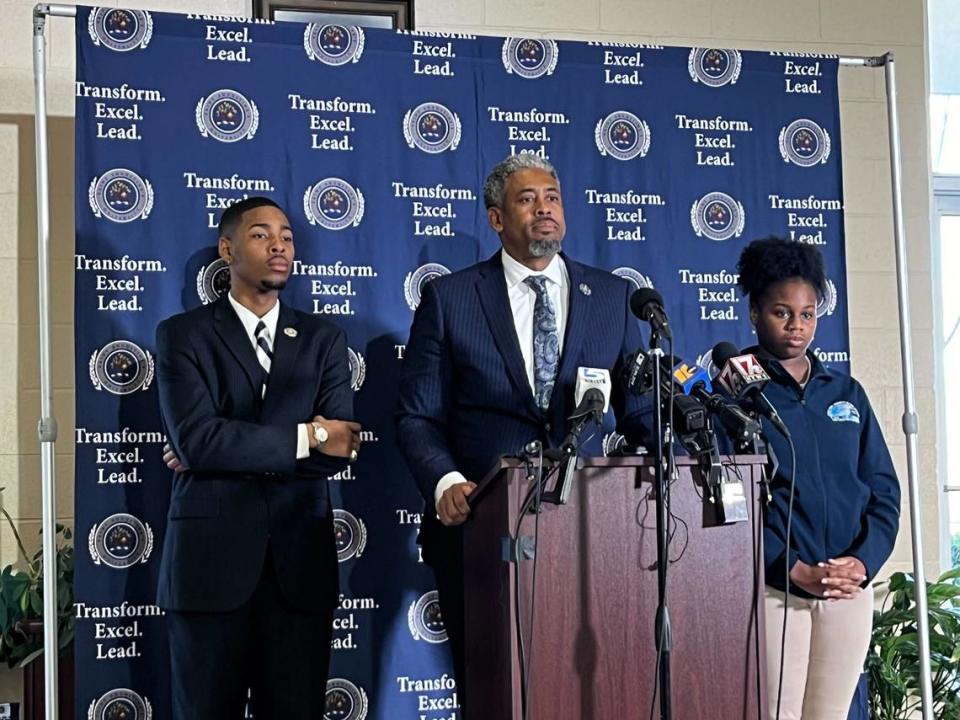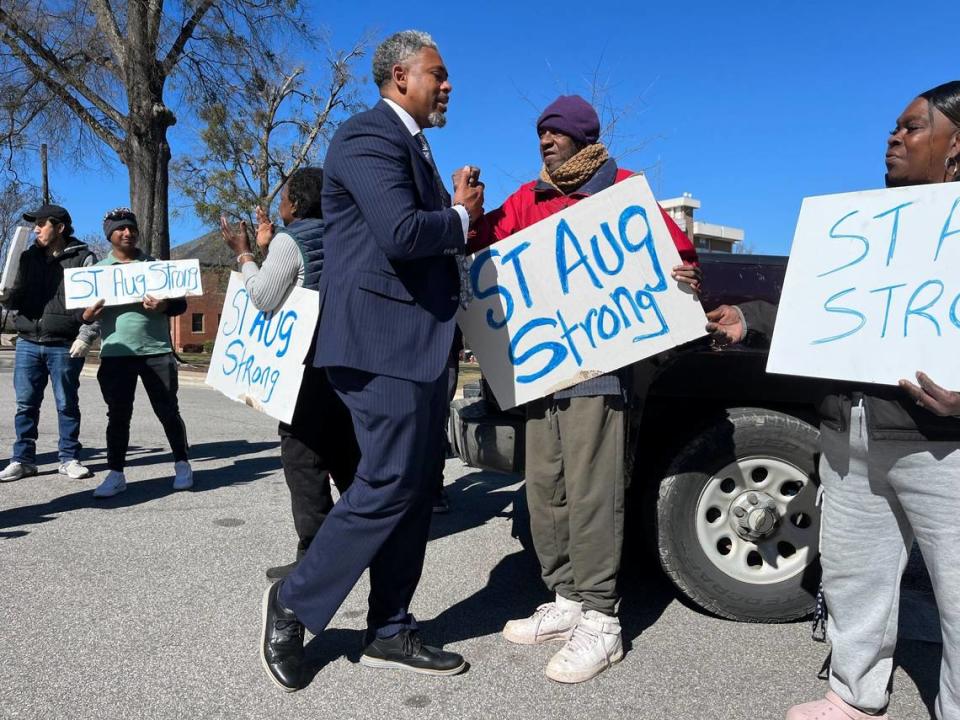‘Working for a better tomorrow’: St. Aug’s president outlines path out of financial woes
St. Augustine’s University is facing financial challenges that threaten the university’s accreditation — and its ability to remain open. But the university’s interim president isn’t giving up on the 157-year-old institution and its future.
In a press conference Monday that sometimes turned emotional, St. Augustine’s Interim President Marcus Burgess acknowledged that the private, historically Black college located near downtown Raleigh is in the midst of a “crisis that threatens the continued viability of our university.”
Burgess, who has been interim president since December, outlined several steps the university will take to address the issues it faces, including appealing a December vote by the Southern Association of Colleges and Schools Commission on Colleges (SACSCOC) to strip the university of its accreditation and remove it from the organization’s membership.
“The issues we face did not begin yesterday and will not simply be gone and resolved by tomorrow,” Burgess said. “But I assure you, our students, faculty, our proud alumni and community — the great Raleigh community, the Oakwood community — that we are working feverishly to structure a cogent and viable plan to extricate this venerable institution from crisis and return to educate in a generation of leaders.”
He said the university is also taking the following steps:
▪ Meeting its payroll obligations for the most recent pay period, which Burgess said represents a “positive and necessary step to reassure our faculty and staff that we recognize the sacrifices that have been made.”
▪ Meeting with the Internal Revenue Service and other companies and agencies to which the university owes money. The IRS last week filed a $7.9 million lien against the university for unpaid taxes dating back four years, WRAL reported.
▪ Hiring a financial consulting firm to prepare a “financial plan to both address our current indebtedness and institute new guidelines and controls going forward.” Burgess said the United Negro College Fund is assisting the university in paying for those services.
▪ Beginning a “forensic audit to determine how the financial issues developed and the extent of liability for the crisis.”
He acknowledged the possibility of staff layoffs and enrolling fewer students in the next year until the university’s finances have stabilized.
“These steps, which do not constitute the entirety of our efforts, do resurrect our financial viability,” Burgess said. “These steps are a thoughtful process to move our beloved St. Augustine’s University forward.”

Accreditation appeal, payroll issues
Monday’s press conference came as the university has encountered its share of upheaval in recent years.
The decision by SACSCOC to strip the university’s accreditation and the university’s subsequent appeal come one year after SACSCOC initially placed the university on probation for many of the same financial issues. The university was previously on probation from 2016 to 2018 for similar reasons.
The university’s Board of Trustees fired previous President Christine McPhail on the same day as the December SACSCOC vote, which she alleges is connected to a discrimination complaint she filed against the board.
The university currently remains on probation, but still accredited with SACSCOC, while the university’s appeal of the accrediting agency’s decision is pending.
Burgess said Monday he is preparing to meet this week with the agency about the appeal. If the appeal is denied, Burgess said the university would resort to litigation — a move with that would come with a hefty price tag for the already-struggling university.
In recent weeks, the university has struggled to pay staff and faculty on time, including for two separate pay periods in late January and early February, Burgess said, citing issues with “cash flow” and the availability of funds to the university.
Burgess said meeting the next payroll “may be a challenge,” but said it’s one of the university’s goals. If the university does not meet payroll, Burgess said faculty and staff will be paid eventually, as funds are available.
Asked whether he is continuing to be paid with the ongoing crisis, Burgess said he is “the last person that receives any money.”

Concerns about current, future St. Aug’s students
Accreditation is crucial to several facets of university operations, including students’ ability to receive financial aid from the federal government. St. Augustine’s spokesperson Demarcus Williams previously said appealing SACSCOC’s decision would allow students to continue receiving aid.
Even so, students undoubtedly feel the effects of the university’s ongoing financial woes. Although “finances are the core” of the issue, Burgess said, “these challenges have bled to every facet of our institution, because our resources are the fuel that propel our mission.”
Burgess said he goes “directly to the students” about the issues, often meeting with them over lunch or in his office. He praised the university’s student services and financial aid staff, who have worked to help students understand the university’s standing and how it impacts them.
Burgess was joined at the press conference by two students: Miles Beasley, a student representative on the Board of Trustees, and Arianna White, president of the university’s student government. The students, both seniors, reflected on what the university means to them and why they still believe in its future.
White, who said she graduated high school with a low GPA, noted that the university chose her, giving her an opportunity to continue her education when other colleges willing to do so.
“SAU has shown me that it’s not always about where you start, but it’s always about, like, how you finish,” White said, growing teary. “And I love SAU. I love my HBCU.”
The ongoing challenges come at the time in the academic year when many high school seniors are applying to college and receiving their admissions decisions. Asked whether St. Augustine’s could, in good conscience, recruit new students to the university as it faces the financial crisis, Burgess said that issue “is definitely a concern.”
The incoming first-year class will likely be smaller than usual, Burgess said, “but that may be a good thing.” The university’s small size — generally enrolling around 1,000 students each year — has made it particularly vulnerable to enrollment declines and associated financial strains over the years, The News & Observer has reported.
The university will likely also make layoffs of faculty and staff, though Burgess did not offer details on when such a decision would be made or how many employees would be impacted.
“We’re going to have to cut to work our way back,” Burgess said. “So, we may have to operate on a leaner budget to ensure our stability going forward.”
HBCU financial, accreditation challenges
Other small, private HBCUs — like St. Augustine’s — in North Carolina have faced their own share of financial and accreditation challenges in the past several years. The U.S. Department of Education last fall highlighted the disparities in funding between historically Black and predominately white public land-grant universities in letters to more than one dozen governors, including North Carolina Gov. Roy Cooper.
“Having worked at HBCUs for 20 years, financial problems are regrettably part of our DNA,” Burgess said. “However, our responsibility is to solve problems, not allowing them to fester and seep into our core mission.”
For example, Bennett College, a private, historically Black college for women located in Greensboro, lost its SACSCOC accreditation in 2018 after being on probation for years over financial issues. After raising $9.5 million in a fundraising campaign and suing SACSCOC, the university became accredited with another agency, the Transnational Association of Christian Colleges and Schools, allowing it to remain open and eligible for federal funding.
Asked how close St. Augustine’s is to shutting its doors, Burgess said such a decision is years away.
“It’s too much out there for us to be successful,” he said. “It would be a tragedy if we didn’t do what we can to keep it open.”
Earlier this month, the university, in celebrating Black History Month, launched a fundraising campaign to raise $5 million “to elevate financial stability and reaffirm SAU’s commitment to providing a high-quality education to its students.” Burgess estimated Monday the university thus far has raised about $1 million.
Burgess, like the students surrounding him Monday, said he believes in the future of St. Augustine’s, and pleaded with others to do the same.
“We’re working for a better tomorrow,” he said. “Please give us the opportunity to make things right.”

